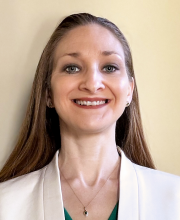Heather C. Tompkins, Ph.D., MS-ATR, LCMHC

Heather C. Tompkins, Ph.D., MS-ATR, LCMHC
Heather C. Tompkins, Ph.D., MS-ATR, LCMHC, is a Military Behavioral Health Psychologist with the Center for Deployment Psychology (CDP) at the Uniformed Services University of the Health Sciences in Bethesda, Maryland. In this role, she provides oversight and fosters collaboration for creative arts related research projects in partnership with the Defense Intrepid Network.
Dr. Tompkins received her BS in comprehensive psychology and art from Troy University, MS in Art Therapy at Florida State University, and post-graduate certification in Substance Abuse Counseling from East Carolina University. She completed a MA and Ph.D. in clinical psychology with a concentration in neuropsychology from Fielding Graduate University. She is a licensed clinical mental health counselor and registered art therapist.
Prior to joining CDP, Dr. Tompkins served as a psychologist at the Department of Veteran Affairs providing assessment and treatment to Veterans with co-occurring substance abuse, mental health, and medical conditions. She has worked across diverse settings in both clinical and non-clinical capacities, including outpatient/community agencies, state hospitals, and military installations providing counseling, training development and facilitation, and consultation. She is trained in EMDR, Cognitive Processing Therapy, Written Exposure Therapy and Art Therapy. Her education and training have allowed her to work with individuals and groups ranging the lifespan to treat, manage, and cope with persistent and severe mental illness, substance abuse, brain injury, PTSD/trauma, and co-occurring disorders, within and outside of the military community.
Complimentary to her professional roles, being a military spouse has provided a unique perspective to the culture, day-to-day life, and stressors of the military family that further informs her work at CDP. Professional interests include moral injury, biopsychosocialspiritual impacts of military life/culture on military spouses, creative arts therapies, mindfulness, and integrative treatment approaches for co-occurring disorders.
